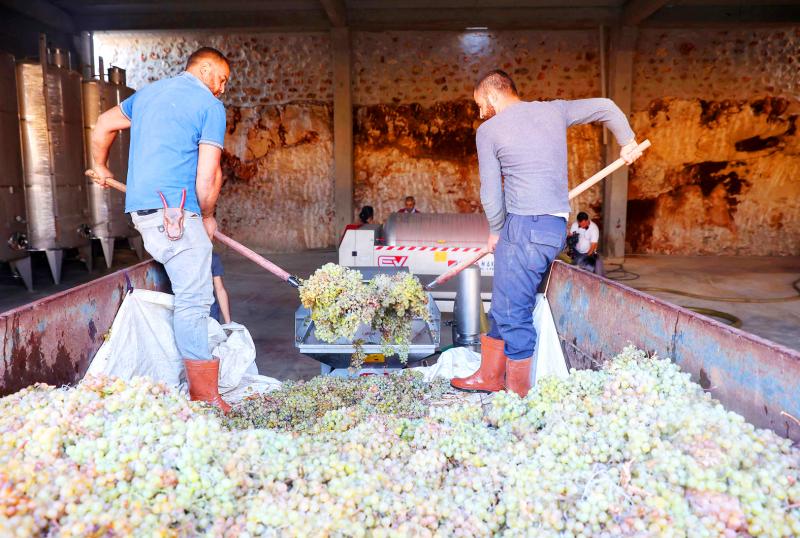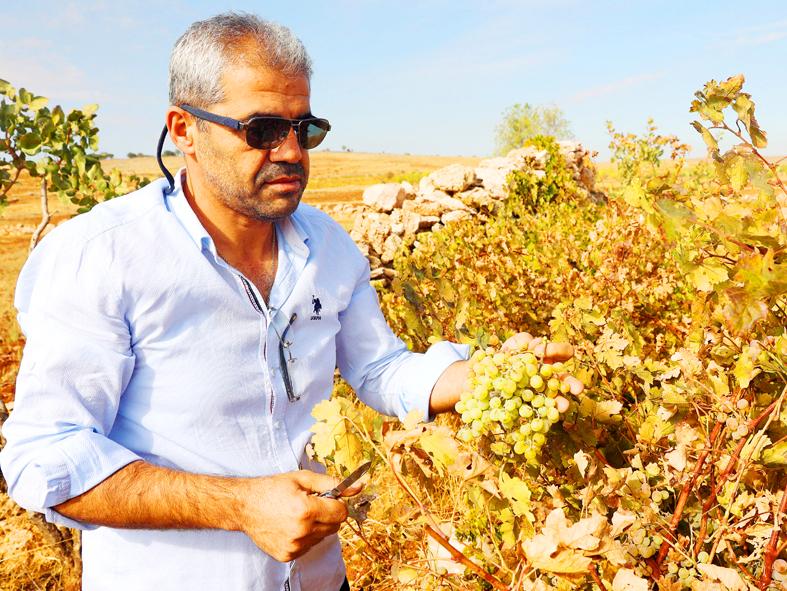Assyrian merchant Yuhanna Aktas no longer has to hide from villagers in his conservative corner of southern Turkey that the grapes they harvest are destined to become wine.
A member of the shrinking Christian minority in Mardin Province, Aktas has been waging a lonely battle for acceptance by his Muslim neighbors and local officials, who frown on alcohol sales.
“Winegrowing and reviving the disappearing Assyrian culture were my childhood dream,” Aktas said, next to barrels of wine fermented from green grapes in Midyat, a town 50km from the Syrian border.

Photo: AFP
Only about 3,000 Assyrians still live in the wider Mardin Province, which is part of the historical Mesopotamia region where some archeologists believe wine was invented 2,700 years ago.
Subjected to discrimination and violence, most of the Assyrians have either relocated to Istanbul or emigrated to the West, reducing their number from 700,000 during the Ottoman Empire to 15,000 across Turkey today.
Their gradual departure over the years has dealt a bruising blow to Mardin’s viticulture traditions, pushing Aktas on a tormented journey to realize his dream.

Photo: AFP
Bespectacled and sporting a hint of a beard, the 44-year-old said he received death threats when he first tried to get wine production rolling in 2009.
“Workers refused to work for me and villagers refused to sell their grapes, saying that wine is forbidden in Islam,” he said.
Yet he persevered, and now sells 110,000 bottles annually throughout Turkey.
The secret to his success was choosing the right local grapes, including a Mazrona variety that has an intense aroma similar to Gewurztraminer grapes used in Alsatian white wines, Aktas said.
Organically farmed and naturally fermented without yeast or sulphites — additives which prolong conservation — the wines have the extra benefit of being much better for your health, Aktas said.
“Other wines can cause headaches because of sulphites. That is never the case with our wine,” he said with a hint of a smile.
Business has been so good that Aktas has launched a second production site in his home village of Beth Kustan, about 30km from the vineyards of Midyat.
Like in other villages across the region, the majority of the original Assyrian families now live in Europe or the US.
Nearly a decade ago, Turkish President Recep Tayyip Erdogan, who was then prime minister, promised to make it easier for these families to reclaim their land, raising hopes for their return.
“Several Assyrians had planned to return to Turkey at the time,” Assyrian Culture Association president Ayhan Gurkan said.
“They renovated their ruined houses, but some saw that their lands had been confiscated by the state or neighboring villagers,” Gurkan said.
The Assyrians’ misfortunes date back to 1915, when many were killed during the genocide of fellow Christian Armenians by Ottoman Turks during World War I. Those who survived and their descendants gradually began to leave.
This exodus accelerated when the first serious clashes erupted between Kurdish militants and the Turkish army across Turkey’s border regions with Syria and Iraq in the 1980s.
A government crackdown on political opponents and the Kurds after a failed coup attempt against Erdogan in 2016 created still more distrust.
Most recently, this febrile atmosphere was exacerbated by the disappearance of an Assyrian couple near the Iraqi border and the conviction of an Assyrian Orthodox priest for “aiding a terror organization.”
“The plans to return home are now suspended,” said Aktas, who himself is facing trial for membership to a group linked to the pro-Kurdish Peoples’ Democratic Party, which Erdogan’s government is trying to ban.
Local sales restrictions and a soaring alcohol tax, which has tripled since Erdogan’s Islamic-rooted Justice and Development Party came to power in 2002, have added to the pressure.
In May, the government banned alcohol sales during a 17-day COVID-19 lockdown, sparking outrage among secular Turks.
However, Aktas said the various attempts to ban or restrict the trade of wine — and his special grapes — have actually helped sales.
“Today, alcoholic beverages are living their golden age in Turkey,” the winemaker said. “The bans have provoked a backlash. Sales have boomed.”
Aktas hopes that something similar could happen to Assyrian culture in Turkey.
“Crushed grapes die during winemaking, but only to start their eternal life through wine,” he said.

Nvidia Corp CEO Jensen Huang (黃仁勳) today announced that his company has selected "Beitou Shilin" in Taipei for its new Taiwan office, called Nvidia Constellation, putting an end to months of speculation. Industry sources have said that the tech giant has been eyeing the Beitou Shilin Science Park as the site of its new overseas headquarters, and speculated that the new headquarters would be built on two plots of land designated as "T17" and "T18," which span 3.89 hectares in the park. "I think it's time for us to reveal one of the largest products we've ever built," Huang said near the

China yesterday announced anti-dumping duties as high as 74.9 percent on imports of polyoxymethylene (POM) copolymers, a type of engineering plastic, from Taiwan, the US, the EU and Japan. The Chinese Ministry of Commerce’s findings conclude a probe launched in May last year, shortly after the US sharply increased tariffs on Chinese electric vehicles, computer chips and other imports. POM copolymers can partially replace metals such as copper and zinc, and have various applications, including in auto parts, electronics and medical equipment, the Chinese ministry has said. In January, it said initial investigations had determined that dumping was taking place, and implemented preliminary

Intel Corp yesterday reinforced its determination to strengthen its partnerships with Taiwan’s ecosystem partners including original-electronic-manufacturing (OEM) companies such as Hon Hai Precision Industry Co (鴻海精密) and chipmaker United Microelectronics Corp (UMC, 聯電). “Tonight marks a new beginning. We renew our new partnership with Taiwan ecosystem,” Intel new chief executive officer Tan Lip-bu (陳立武) said at a dinner with representatives from the company’s local partners, celebrating the 40th anniversary of the US chip giant’s presence in Taiwan. Tan took the reins at Intel six weeks ago aiming to reform the chipmaker and revive its past glory. This is the first time Tan

CUSTOMERS’ BURDEN: TSMC already has operations in the US and is a foundry, so any tariff increase would mostly affect US customers, not the company, the minister said Taiwanese manufacturers are “not afraid” of US tariffs, but are concerned about being affected more heavily than regional economic competitors Japan and South Korea, Minister of Economic Affairs J.W. Kuo (郭智輝) said. “Taiwan has many advantages that other countries do not have, the most notable of which is its semiconductor ecosystem,” Kuo said. The US “must rely on Taiwan” to boost its microchip manufacturing capacities, Kuo said in an interview ahead of his one-year anniversary in office tomorrow. Taiwan has submitted a position paper under Section 232 of the US Trade Expansion Act to explain the “complementary relationship” between Taiwan and the US